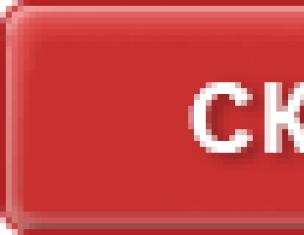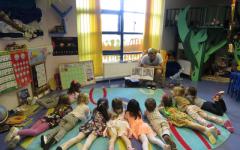Amzayan K.S. 1
Ivanenko N.N. one
1 Municipal budgetary educational institution secondary school with in-depth study of individual subjects No. 5 named after A.M. Dubinny city of Pyatigorsk
The text of the work is placed without images and formulas.
The full version of the work is available in the "Job Files" tab in PDF format
What is it - the youth of the twenty-first century? If you ask this question to grandparents, they will say that this generation, which lives one day, does not think about anything. They don't need anything, they don't care about anything. Perhaps they are right?
Today's youth are very different from their peers living in the twentieth century. First, they are much more informed than they are, because the latest technology allows you to get a much larger amount of information than fifteen or twenty years ago. Secondly, it cannot be said that today young people are less educated. On the contrary, they know more because they can get knowledge from many sources. They just live in a different time. But the important human values for today's youth, in my opinion, have remained the same. They also love and want to be happy, just like young people a hundred and two hundred years ago. They also want to find themselves, their place in this world.
However, unfortunately, every day in my school I see fifth graders and fifth graders who are not looking up from their phones, tablets and other gadgets. Instead of running through the corridors of the school, as our parents used to do, they communicate, play, listen to music. The interests of children have changed radically. And I think it's pretty sad. After all, children should remain children, play, run, jump, have fun, and not grow up ahead of time.
It is sad to watch how childhood - a cheerful, joyful time of happiness and carelessness, turns into a time of "adult" children who are only interested in communication. All of them consider themselves adults, serious and look with contempt at us, pupils of elementary grades. I don't understand why this is happening. Why do children stop being children?
On the one hand, of course, scientific and technological progress is gaining momentum, gadgets are everywhere that make life easier for a person. But on the other hand, children stop playing on the streets, instead they are busy with online games, they stop communicating normally with their peers: live communication has been replaced by the Internet. It is sad to look at all this, to lose children's joyful looks from riding a hill and to see how children are fascinated by the Internet and other means. What will happen next is still unknown, but one thing is clear for sure - the old childhood can not be returned!
The further fate of society is in our hands and everything possible must be done to avoid the loss of simple human joys, children's laughter and smiles!
Creative work "Child of the XXI century"
XXI Century. What is he? What families live in it? What children? What kind of upbringing do our children receive? What are the "pros" and "cons" of our upbringing? There are many such questions. There are no definite answers to them.
Education… What does it mean to me? What is education in our twenty-first century?
Educate a student!.. Just two words, but behind them is purposeful, everyday, sometimes invisible work, the work of a class teacher.
But before talking about the upbringing of a student, we need to go back five or six years ago, when the child is just beginning to learn about the world.
The modern child differs in many ways from his predecessors. Children now assess the world around them more maturely than children of the same age, say, 50 years ago. They have a picture of the world - that's one thing. But how much they live in this picture is the question. A modern, say, 5-year-old child can read, turns on the computer, but he stumbles when he goes up the stairs. When you throw a ball to him, he does not raise his hand and gets hit in the face with the ball. So this person is more, shall we say, older than his predecessor, who, perhaps, did not know what a business plan is or what the Internet is, but he did not get hit in the face when the ball flew towards him. I want to say that there is something else. It's not better, it's not worse, it's just different. Another program, as if rearranged programs on computers.
Many parents believe that if their child knows and understands car brands at the age of 3, then it's great that they did not know this at one time. In my opinion, this is not the most important thing. Now the child, in principle, is not very adaptable in society. He knows some global problems about Obama, about the president, about Putin, but he doesn't know some ordinary things that were brought up in the Soviet Union by the kids of that time. For example, a child cannot go out for a walk alone at the age of 6. In my opinion, a child needs to develop specific vital skills and abilities, develop creative abilities, attitude towards himself and others, the ability to communicate with his peers and not only.
At present, the child is left to himself. But now the child has a much wider range of entertainment that he can afford. And of course, most of the entertainment is connected with the computer. Excessive communication with the computer, in turn, adversely affects the health of children and the inability to communicate with people around them. You can talk about this topic for a long time, but I'm not talking about that. I want to say that closer communication with the computer should begin only at school age. This is where the teacher can play a big role.
Who will be the child's first teacher is a question every parent asks himself when he brings his child to school for the first time. Fear of the unknown is always scary. Into whose hands shall we place the schooling of our child? Will he have a desire to attend school, a desire to acquire new knowledge, a desire to communicate with peers, how quickly will he adapt to new conditions?
For 10 years of a child's life, from early childhood to adolescence, the school is actually half of the life - the first half of the day children spend at school. Therefore, naturally, most of the information comes from the school. And it's not just education. And here it is necessary to interest the modern child in new, modern technologies.
But still, one should not rely entirely on the use of ICT technologies. Only insofar as. New technologies, of course, are needed in the sense that today's children and those who went to school 10-20 years ago are very different from each other. They use all the technical innovations, and teaching them through a blackboard and chalk is already the last century. But not the computer in the classroom is the main one. Now children are more informed - they have the whole Internet - but (and this is a big problem for us elementary school teachers) they do not read much.
My pedagogical principle is to help the student open up, instill confidence in him, give him the opportunity to feel his self-worth ineducational activity.
Each little person in my lesson is a person with his own character, outlook on life, habits. He comes to class with his mood, problems, joys and sometimes sorrows. It is important for me to understand the child, not to infringe on his human dignity, to help him learn something new, to rejoice with him in his little discoveries, to pity him if he is sad.
And I would like to finish my thoughts with the words of a child of the 21st century, which touched me to the core. I think these words are worth thinking about.
We are the children of the 21st century.
Chernyshova Anastasia
We are children of the 21st century. Our interests were reduced to an attempt to seem mature and independent. We often forget who we really are. We run away from problems in alcohol and drug doses. We dream of a bright future and destroy the present. Our end is inevitable and no matter how keenly we would not realize it, our generation cannot be changed... Our communication has been replaced by computers and the World Wide Web... We do not know all the dates in history, but we know all brands of cigarettes... we do not know how apply mathematical formulas, but we know all brands of beer ... we do not know all writers, but we know the prices of heroin ... we know everything and know nothing ... We proudly take a step into the abyss, from the roof, believing that our the point of view is the most correct and there is no other way out ... we swallow pills because of unhappy love, hoping that we will be noticed, pitied ... saved ... we know how to play roles, we know how to write thoughts, we know how to do bold deeds, we know how live as we want, we have our own opinion, we know how to experience pain, we know how to shed tears, love, wait, dream and wish ... we know how to do everything ... and we don’t know how to do anything ... our childhood is dead: they threw away the dolls , dismantled cars, untwisted pigtails, put on short skirts, high heels ... in handbags lipstick, * sweet * perfume, a pack of cigarettes, money for beer, accessibility, promiscuity and depravity ... WE ARE CHILDREN OF THE 21st CENTURY ...
Children of the 21st century. Who are they? What are they? How are they different from previous generations? What are their features and capabilities? Many questions arise when you start thinking about children in the 21st century. And the answer is obvious: they are just different, they are smarter and smarter, more talented and versatile, and you can educate them in different ways. But, in any case, be sure that with the right approach to raising and developing children at the age of 7, they can already speak several languages fluently.
The first six years of a child's life are key to their development. At this stage, the ground is being prepared for his future success in our modern international world.
The director of the English private children's center for preschool education OC "Our children-Our school" Elaine Podovinikoff revealed some of the secrets of raising children.
Elaine taught for 25 years in Western Canada where she gained experience working with children aged 3 to 18. In addition to teaching in the classroom, she coordinated second language courses, chaired a committee to research and create new early childhood education programs, select academic materials, and organized student groups for tours to Russia. Over the past 15 years, 3 out of 5 of her books (2 volumes of a poetic trilogy and a biographical story) have been published in the USA. The third volume of the ‘Russian Routes’ trilogy and vegetarian recipes have been published in Russia. At the moment, Elaine has been working in the educational system in Russia for 12 years and is the head of the English private kindergarten OC “Our children-Our school”. All materials for teaching, educating and revealing the abilities of children at an early age, Elaine develops independently. By the way, Elaine has three children and 9 grandchildren. And the children in the center simply call her Mrs. Pod.
What is OC? And why is there always an atmosphere of happiness?
OC "Our Children - Our School" is a children's center founded by a team of Canadian teachers who have been living in Moscow since 2000 and teaching English to children. Our goal is to make the process of immersing a child in English easy and comfortable, to fill his every day with joy with us. In kindergarten, we communicate with children exclusively in English, and even if the child does not speak English, he understands universal gestures and feels our love, feels that we accept him and respect his opinion. A week later, he begins to pronounce his first phrases, and a week later he sings songs in English. Children learn very quickly, copy the behavior of other children, learn from each other. OC- these are three spacious bright rooms for three age groups: tots– for children from 2.5 to 4 years old, Preps- from 4 to 5 years old and Grads- from 5 to 7 years old. A large sports hall, a library and a room for creativity, as well as a modern playground for outdoor games in a protected area of a residential complex. Each group has a senior teacher (native speaker) and assistants at the rate of 5 children per adult, 2 nannies who speak English and a psychologist. During the summer we work with children at our summer camp in Greece.
The main thing in life and in our profession is, of course, love! Always show your child your love and let's understand how you appreciate and understand him

Children's thoughts and their development:
- From birth to 3 months I see, hear, smell and taste. I pay to tell you when I need something.
- 3 to 6 months- I move my arms and legs. I am trying to talk to you.
- 6 to 9 months- I notice when you leave the room. Unfamiliar faces, things and places can scare me.
- 9 to 12 months– I know that you are there, even when I do not see you. I am already a person.
- 1 to 2 years“I recognize myself. I want to explore the world around. I push and pull things, I chew on everything, I taste everything. I am learning.
- 2 to 3 years– I like to draw and play. I have a lot of energy. I think others think the same as me.
- 4 to 5 years- I dress myself. I love making my own decisions. I'm growing up.
In the Disney cartoon, Scrooge McDuck had a thinking room, do you have a similar thinking chair in the center?
Oh yeah! (laughs Elaine) This is one of the psychological moments of influence on the child, which allows him to understand what he did, to think about his actions and actions. It is very important not to combine the child and his act into one whole; there is a child who is always the embodiment of "purity and innocence", and there is his choice, the act for which he is responsible. There is a chair, and children love this chair very much, because they believe that after it they become wiser and more mature, so we limit the time of sitting on the chair depending on the age of the child. For example, if a child is 4 years old, then he can sit on a chair from 4 to 8 minutes, no more.

Ways to boost your child's self-esteem:
- Celebrate the child's abilities and successes;
- Try in any situation to let the child feel that he is doing something;
- Give your child a sense of stability in life;
- Notice all the positive and special features that are unique to your child, and pay attention to them;
- Intervene when something is not working out for your child, when he is upset and does not believe that he will cope with the situation;
- Be realistic about children's self-esteem and help them cope with setbacks;
- Instill in your child optimism and a positive attitude towards yourself.
Elaine, in addition to classes with children, you also conduct classes / seminars with parents of children. Why do you think it is necessary?
Yes, I do, because families are different, and sometimes between seemingly the closest people, between children and their parents, there is a blank wall of mutual misunderstanding.
An excerpt from a seminar on the topic “You are not listening ...” (From Child to Parent)
You don't hear me when...
- You don't care about me
- You say you understand me before you know me better
- You tell me the solution to my problem before I even explain what it is.
- You interrupt me without giving me a chance to finish
- You find me boring and don't talk about it
- You criticize my vocabulary, grammar or accent
- You blush to tell me something
- You talk to me about your experience in a way that makes my experience seem unimportant.
- You are talking to someone else who is in the room
- You dismiss my thanks by saying you didn't really do anything.
Can you hear me if...
- You quietly enter my own world and let me be myself
- You really try to understand me, even if what I say makes little sense
- You accept my point of view, even if it goes against your beliefs.
- You understand that the hour I spent with you left you a little tired and empty.
- You allow me such a display of self-esteem as making decisions on my own, even if you think that they may be wrong.
- You don't take on my problems, but you let me deal with them my way.
- You hold back your desire to give me good advice
- You don't offer me religious solace when you feel like I'm not ready for it.
- You give me enough space so I can discover what's going on.
- You accept my words of gratitude, telling me how good you feel knowing that you were useful
In my practice, there were many interesting psychological moments on how to guide a child. The main thing is to teach him HOW to think, not WHAT to think.
- Please tell us how you guide children on the example of a specific case.
One day, the children broke a vase that, let's say, cost $20. But the price of the vase itself is not important here, something else is important here - how to show the child that he himself is responsible for his actions, what his actions can lead to and how he can solve the problem on his own. There is a fact - a broken vase, we take this fact for granted. And there is a problem: how to compensate for the cost of the vase? And any problem can be solved. We gathered children who broke a vase and voiced the problem: “So! Children! You and I broke a vase that costs $20, how can we fix the problem without resorting to the help of our parents? What will be your suggestions? The solution was this: the children baked cookies at home and sold them to neighbors, collected the required amount and proudly brought it to us. As a result, the following happened: the children solved the problem on their own, their self-esteem rose, they gained experience.
Very often, children teach their parents, and not vice versa. For example, they do not allow me to speak Russian with them in the kindergarten. As soon as this happens, they put their hands on their hips, look at me with childish cute condemnation and shout: “Mrs. Pod, English, please!"
Educators must be consistent in their work, being aware of the difference between discipline and punishment. One increases the self-confidence of the child, the other humiliates self-esteem. Everything should be consistent, clear and simple for the perception of the child.

How to help your child grow up in society, and teach him to respect others and sympathize with them:
- Communicate face to face
- Let your child play with other children
- Create a solid foundation
- Learn to respect your child's character
- Take good care of your child and those around you
- To make the child feel like a full member of the family, come up with duties for him that he could perform on his own
- Encourage and praise the child if he did something right
- Prepare your child for inclusion in society and help him
- Fantasize together
- Involve your child in your daily activities
- Solve problems together and look for ways to resolve the conflict together
- Don't let your child watch too much TV and watch with him
- Let the child choose things to donate to charity
- Be gentle, loving and caring
- Set clear rules
- Let your child make mistakes
- Be a good example for your child
- Teach your child to understand how their actions affect others
- Let you have a common family goal, for example, “Charity”
- Tell your child every day that you are proud of him!
Nikita Sokolov, editor of the Otechestvennye Zapiski magazine, historian

Children born in the 21st century do not know examples from the past. For them, the new world is the only possible one. Therefore, from an early age, modern children are ready for competition, for the struggle for survival.
The second change that influenced the change in the child is less global, but no less important. The yard, as one of the most important social institutions of the Soviet era, has disappeared from the life of modern children.
If earlier a child came from school and ran to the street, where he communicated with peers, thus learning to interact with society, then for modern children this experience is less important.
Now, sitting at the computer, the child himself decides with whom to communicate and with whom not. On the one hand, it's not bad. But on the other hand, the child, getting into the real, and not the virtual world, turns out to be helpless and unable to interact normally with other people.
Natalya Kirillina, psychiatrist, candidate of medical sciences, director of the Institute for Harmonious Development and Adaptation (IGRA)

Daria Khalturina, sociologist, head of the group for monitoring strategic risks and threats of the Center for Civilizational and Regional Studies of the Institute for African Studies of the Russian Academy of Sciences
Igor Kon, Doctor of Medical Sciences, Professor, Head of the Baby Nutrition Department of the Federal State Budgetary Institution Research Institute of Nutrition of the Russian Academy of Medical Sciences

In the last 30-40 years, foods have appeared in the diet of Russians, the existence of which was not previously known. On the one hand, the nutritional value has increased, on the other hand, fast food and other fast food products have become very popular: chips, crackers. Sweet carbonated and non-carbonated drinks spread.
With these products, the child receives an excess of saturated fats, sugar and salt, which contribute to the development of cardiovascular diseases. There is a tendency in society to reduce the consumption of homemade food. Women have become emancipated and no longer want to cook.
Children are forced to switch to dumplings, sausages and other fast food products. Of course, avoiding natural products affects the health of the child. Another negative factor is the lack of sufficient physical activity.









